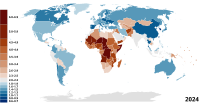
Photo from wikipedia
This paper uses the implementation of Ghana’s Free Compulsory Universal Basic Education (FCUBE) in 1996 as a natural experiment to investigate the causal effect of female education on adolescent fertility… Click to show full abstract
This paper uses the implementation of Ghana’s Free Compulsory Universal Basic Education (FCUBE) in 1996 as a natural experiment to investigate the causal effect of female education on adolescent fertility and early marriage. Girls who were exposed to the reform had more education, higher age at first marriage, and low fertility than girls who were not exposed to the reform. We find that the effect of the reform on adolescent fertility and early marriage decreases with age, and that the effect becomes statistically insignificant after age 19. There is some evidence that education affects adolescent fertility and early marriage as a result of knowledge acquisition, but we could find no evidence to support the view that education induces abstinence. Finally, we demonstrate that the effect of education on fertility and marital status differs by household wealth level and urban/rural community type.
Journal Title: Journal of African Economies
Year Published: 2017
Link to full text (if available)
Share on Social Media: Sign Up to like & get
recommendations!